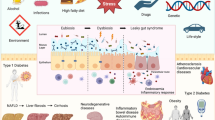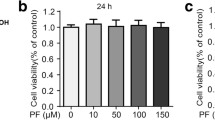Abstract
Ulcerative colitis (UC) is a type of inflammatory bowel disease characterized by inflammation of the large intestine, rectal bleeding, and abdominal pain. It can be alleviated by certain bioactive compounds, including α-linolenic acid (ALA), which is a bioactive component in fermented black radish (Raphanus sativus L. var. niger). The aim of this study was to evaluate the anti-inflammatory effects of ALA in dextran sulfate sodium (DSS)-induced UC in mice. UC was induced in C57BL/6 mice by allowing them to freely drink water containing 2.5% DSS for 7 days, followed by oral administration of ALA (30 and 60 mg/kg/day) or vehicle control for 7 days. DSS-induced colitis was evaluated using the Disease Activity Index (DAI) and by measuring colon length and performing a histopathological examination. Compared to the control group, the vehicle-treated group showed a higher DAI score, shorter colon, goblet cell loss, and crypt shortening. The ALA treatment mitigated clinical signs of UC and histopathological changes. Furthermore, it mitigated intestinal inflammation by reducing the expression of ionized calcium binding adaptor molecule 1-positive macrophages in the colon. These results show that ALA alleviates DSS-induced UC by suppressing colon damage, which includes goblet cell loss, crypt shortening, and a reduction of macrophages in the colon.





Similar content being viewed by others
References
Ahn, M., J. Kim, Y. Choi, P. Ekanayake, J.Y. Chun, D. Yang, G.O. Kim, and T. Shin. 2019. Fermented black radish (Raphanus sativus L. var. niger) attenuates methionine and choline deficient diet-induced nonalcoholic fatty liver disease in mice. Food Science & Nutrition 7 (10): 3327–3337. https://doi.org/10.1002/fsn3.1200.
Alavala, S., R. Sangaraju, N. Nalban, B.D. Sahu, M.K. Jerald, E.K. Kilari, and R. Sistla. 2019. Stevioside, a diterpenoid glycoside, shows anti-inflammatory property against dextran sulphate sodium-induced ulcerative colitis in mice. European Journal of Pharmacology 855: 192–201. https://doi.org/10.1016/j.ejphar.2019.05.015.
Asghari, M.H., R. Hobbenaghi, A. Nazarizadeh, and P. Mikaili. 2015. Hydro-alcoholic extract of Raphanus sativus L. var niger attenuates bleomycin-induced pulmonary fibrosis via decreasing transforming growth factor beta1 level. Res Pharm Sci 10 (5): 429–435.
Banihani, S.A. 2017. Radish (Raphanus sativus) and diabetes. Nutrients 9 (9). https://doi.org/10.3390/nu9091014.
Cheadle, A., P.M. Schwartz, S. Rauzon, W.L. Beery, S. Gee, and L. Solomon. 2010. The Kaiser Permanente Community Health Initiative: Overview and evaluation design. American Journal of Public Health 100 (11): 2111–2113. https://doi.org/10.2105/AJPH.2010.300001.
Choi, K.C., S.W. Cho, S.H. Kook, S.R. Chun, G. Bhattarai, S.B. Poudel, M.K. Kim, K.Y. Lee, and J.C. Lee. 2016. Intestinal anti-inflammatory activity of the seeds of Raphanus sativus L. in experimental ulcerative colitis models. Journal of Ethnopharmacology 179: 55–65. https://doi.org/10.1016/j.jep.2015.12.045.
Eichele, D.D., and K.K. Kharbanda. 2017. Dextran sodium sulfate colitis murine model: An indispensable tool for advancing our understanding of inflammatory bowel diseases pathogenesis. World Journal of Gastroenterology 23 (33): 6016–6029. https://doi.org/10.3748/wjg.v23.i33.6016.
Goncalves, N. B., R. F. Bannitz, B. R. Silva, D. D. Becari, C. Poloni, P. M. Gomes, M. C. Foss, and M. C. Foss-Freitas. 2018. Alpha-linolenic acid prevents hepatic steatosis and improves glucose tolerance in mice fed a high-fat diet. Clinics (Sao Paulo) 73:e150. doi:https://doi.org/10.6061/clinics/2018/e150.
Hou, J.K., H. El-Serag, and S. Thirumurthi. 2009. Distribution and manifestations of inflammatory bowel disease in Asians, Hispanics, and African Americans: A systematic review. The American Journal of Gastroenterology 104 (8): 2100–2109. https://doi.org/10.1038/ajg.2009.190.
Jeyapal, S., S.R. Kona, S.V. Mullapudi, U.K. Putcha, P. Gurumurthy, and A. Ibrahim. 2018. Substitution of linoleic acid with alpha-linolenic acid or long chain n-3 polyunsaturated fatty acid prevents Western diet induced nonalcoholic steatohepatitis. Scientific Reports 8 (1): 10953. https://doi.org/10.1038/s41598-018-29222-y.
Kim, J., S. Ahn, and I. Song. 2004. A research of the radish based on the Sasang constitutional medicine (SCM). Korean Journal of Oriental Medicine 10 (1): 63–80. https://doi.org/10.7841/ksbbj.2017.32.1.46.
Kim, J., M. Ahn, Y. Choi, P. Ekanayake, G. O. Kim, and T. Shin. 2019. Antifibrotic effects of fermented black radish (Raphanus sativus L. var. niger) on chronic liver injury in rats. Orient Pharm Exp Med. doi:https://doi.org/10.1007/s13596-019-00392-y.
Kim, J., M. Ahn, S.E. Kim, H.S. Lee, H.K. Kim, G.O. Kim, and T. Shin. 2017. Hepatoprotective effect of fermented black radish (Raphanus sativus L. var niger) in CCl4 induced liver injury in rats. J Prev Vet Med 41 (4): 143–149.
Kim, K.H., C.S. Kim, Y.J. Park, E. Moon, S.U. Choi, J.H. Lee, S.Y. Kim, and K.R. Lee. 2015. Anti-inflammatory and antitumor phenylpropanoid sucrosides from the seeds of Raphanus sativus. Bioorganic & Medicinal Chemistry Letters 25 (1): 96–99. https://doi.org/10.1016/j.bmcl.2014.11.001.
Mahmoudi, R., M. Ghareghani, K. Zibara, M. Tajali Ardakani, Y. Jand, H. Azari, J. Nikbakht, and A. Ghanbari. 2019. Alyssum homolocarpum seed oil (AHSO), containing natural alpha linolenic acid, stearic acid, myristic acid and beta-sitosterol, increases proliferation and differentiation of neural stem cells in vitro. BMC Complementary and Alternative Medicine 19 (1): 113. https://doi.org/10.1186/s12906-019-2518-4.
Ng, S.C., H.Y. Shi, N. Hamidi, F.E. Underwood, W. Tang, E.I. Benchimol, R. Panaccione, S. Ghosh, J.C.Y. Wu, F.K.L. Chan, J.J.Y. Sung, and G.G. Kaplan. 2018. Worldwide incidence and prevalence of inflammatory bowel disease in the 21st century: A systematic review of population-based studies. Lancet 390 (10114): 2769–2778. https://doi.org/10.1016/S0140-6736(17)32448-0.
Olendzki, B.C., T.D. Silverstein, G.M. Persuitte, Y. Ma, K.R. Baldwin, and D. Cave. 2014. An anti-inflammatory diet as treatment for inflammatory bowel disease: A case series report. Nutrition Journal 13: 5. https://doi.org/10.1186/1475-2891-13-5.
Pauls, S.D., L.A. Rodway, T. Winter, C.G. Taylor, P. Zahradka, and H.M. Aukema. 2018. Anti-inflammatory effects of alpha-linolenic acid in M1-like macrophages are associated with enhanced production of oxylipins from alpha-linolenic and linoleic acid. The Journal of Nutritional Biochemistry 57: 121–129. https://doi.org/10.1016/j.jnutbio.2018.03.020.
Sairenji, T., K.L. Collins, and D.V. Evans. 2017. An update on inflammatory bowel disease. Primary Care 44 (4): 673–692. https://doi.org/10.1016/j.pop.2017.07.010.
Solomon, Livingstone, Sorsiah Mansor, Peter Mallon, Eilish Donnelly, Margaret Hoper, Morris Loughrey, Stephen Kirk, and Keith Gardiner. 2010. The dextran sulphate sodium (DSS) model of colitis: An overview. Comp Clin Path 19 (3): 235–239. https://doi.org/10.1007/s00580-010-0979-4.
Timoszuk, M., K. Bielawska, and E. Skrzydlewska. 2018. Evening primrose (Oenothera biennis) biological activity dependent on chemical composition. Antioxidants (Basel) 7 (8). https://doi.org/10.3390/antiox7080108.
Woo, J.K., S. Choi, J.H. Kang, D.E. Kim, B.S. Hurh, J.E. Jeon, S.Y. Kim, and S.H. Oh. 2016. Fermented barley and soybean (BS) mixture enhances intestinal barrier function in dextran sulfate sodium (DSS)-induced colitis mouse model. BMC Complementary and Alternative Medicine 16 (1): 498. https://doi.org/10.1186/s12906-016-1479-0.
Funding
This work was supported by Korea Institute of Planning and Evaluation for Technology in Food, Agriculture, Forestry and Fisheries (IPET) through Agri-Bio industry Technology Development Program, funded by Ministry of Agriculture, Food and Rural Affairs (MAFRA) (grant number: 316006-05-1-HD040).
Author information
Authors and Affiliations
Corresponding author
Ethics declarations
Conflict of Interest
The authors declare that they have no conflict of interest.
Ethics Statement
All experimental procedures were followed in accordance with the guidelines for the Care and Use of Laboratory Animals at Jeju National University (permission number 2016-0040). The animal protocols also conformed to current international laws and the policies of the National Institute of Health Guide for the Care and Use of Laboratory Animals (NIH Publication No. 85-23, 1985, revised 1996).
Additional information
Publisher’s Note
Springer Nature remains neutral with regard to jurisdictional claims in published maps and institutional affiliations.
Rights and permissions
About this article
Cite this article
Kim, J., Ahn, M., Choi, Y. et al. Alpha-Linolenic Acid Alleviates Dextran Sulfate Sodium-Induced Ulcerative Colitis in Mice. Inflammation 43, 1876–1883 (2020). https://doi.org/10.1007/s10753-020-01260-7
Published:
Issue Date:
DOI: https://doi.org/10.1007/s10753-020-01260-7




